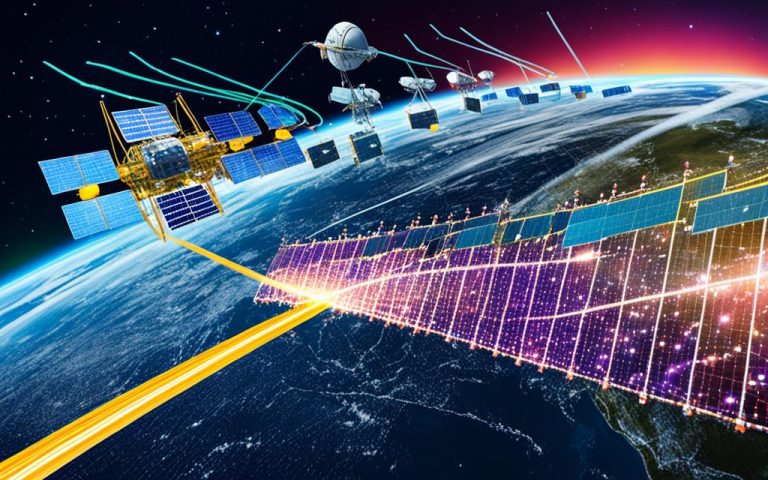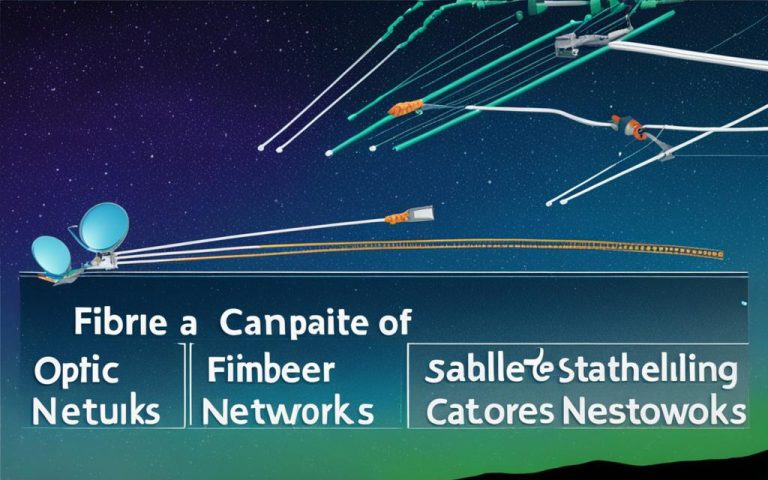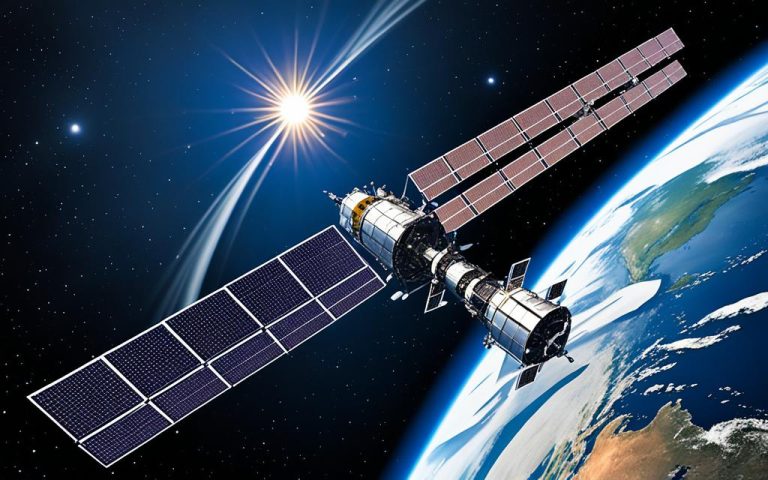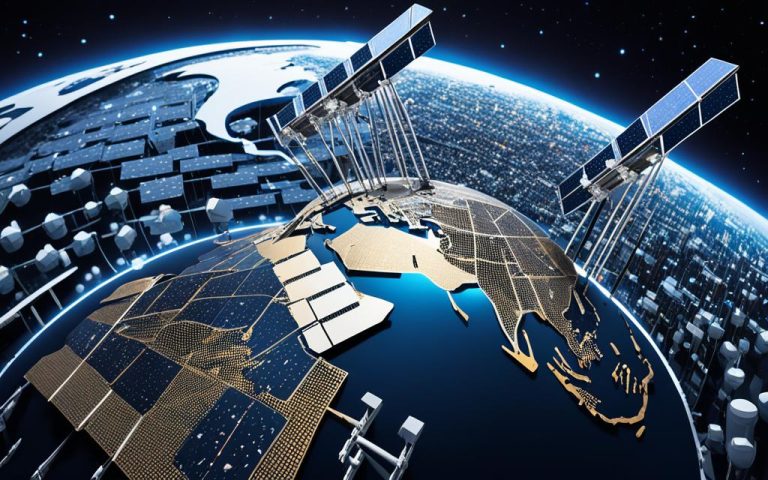Satellite networks have revolutionized global communication, enabling seamless connectivity and bringing the world closer together. However, the operation of these networks is subject to various legal challenges, requiring a careful navigation of regulations and adherence to global standards.
When it comes to satellite network regulations, a complex legal landscape arises from international treaties and conventions. Key agreements, such as the 1967 Outer Space Treaty and the International Telecommunications Union’s Radio Regulations, govern different aspects of satellite operations.
These regulations pose significant legal challenges that must be addressed. Data privacy and security, for instance, are paramount concerns in a digital age. Protecting user information from unauthorized access and ensuring robust security measures are in place to prevent cyberattacks are critical priorities.
Moreover, satellite networks also introduce intricate taxation issues influenced by usage and location. Understanding and complying with taxation requirements can be a complex endeavor for satellite operators operating on a global scale.
To ensure a smooth operation of satellite networks, it is imperative to have a comprehensive understanding and respect for the legal framework that governs their use. By doing so, we can strike a balance between innovation and legal compliance, allowing satellite technology to thrive while safeguarding user rights and interests.
In the following sections, we will delve deeper into specific aspects of satellite network regulations, including data privacy and security, taxation, international legal systems, the role of international organizations, licensing requirements, and the challenges that arise. By exploring these topics, we aim to provide insights and guidance for those involved in satellite network operations.
Data Privacy and Security in Satellite Networks
The growth of satellite communications raises significant concerns about data privacy and security. With the increasing reliance on satellite networks for global connectivity, it is imperative to safeguard user data from cyberattacks and ensure the highest level of security measures.
To protect user data from potential cyber threats, robust security measures are implemented in satellite networks. Encryption techniques are employed to secure data transmission and prevent unauthorized access. Additionally, digital rights management systems are utilized to prevent copyright infringement and safeguard sensitive information.
In an interconnected world where cyberattacks continue to evolve, it is crucial to remain vigilant and proactive in implementing security protocols. Satellite networks, being an integral part of the global communication infrastructure, require continuous monitoring and optimization to address emerging threats.
“Ensuring data privacy and security in satellite networks is paramount. It involves adopting state-of-the-art technologies, implementing robust encryption protocols, and maintaining strict access controls.” – Professor Lisa Adams, Cybersecurity Expert.
Benefits of Implementing Security Measures:
- Protection against cyberattacks and unauthorized access
- Preservation of user privacy and confidentiality
- Prevention of copyright infringement
- Securing sensitive information
- Enhanced trust and confidence in satellite networks
Case Study: Encryption Protocols in Satellite Networks
| Encryption Protocol | Key Features |
|---|---|
| AES (Advanced Encryption Standard) | Industry-standard symmetric encryption algorithm widely used for secure data transmission |
| RSA (Rivest-Shamir-Adleman) | Asymmetric encryption algorithm for secure key exchange and authentication |
| HTTPS (Hypertext Transfer Protocol Secure) | Secure communication protocol that uses encryption to transmit data over the internet |
| VPN (Virtual Private Network) | Secure network connection that encrypts data traffic between endpoints |
Implementing these security measures ensures that satellite networks remain resilient to potential cyber threats and provide users with a safe and secure communication channel.
Taxation in Satellite Networks
The expansion of satellite networks presents organizations with complex taxation issues that are influenced by usage and location. As satellite networks have become integral to global trade, enabling instant and secure long-distance communication, businesses are increasingly leveraging these networks to expand their operations globally.
The global reach of satellite networks introduces unique challenges when it comes to taxation. The complexity arises from the diverse array of tax regimes across jurisdictions and the intricate nature of satellite technology. Governments around the world are grappling with the task of designing taxation policies that align with the characteristics and functions of satellite networks.
The taxation of satellite networks involves multiple aspects, including revenue generation, usage fees, and royalties. Governments need to balance the need for fair taxation against encouraging the growth and innovation within the satellite industry, which plays a vital role in various sectors, including telecommunications, broadcasting, and navigation.
Taxation Issues and Considerations
When it comes to satellite network taxation, several factors contribute to its complexity:
- Global Presence: Satellite networks transcend national borders, making it challenging for tax authorities to determine the appropriate jurisdiction for taxation purposes. The question of how to allocate income, calculate taxes, and attribute profits becomes increasingly complex.
- Intangible Nature of Services: Satellite services, such as data transmission and remote sensing, are often intangible and difficult to quantify from a tax perspective. Tax authorities must grapple with how to value and tax these intangible services accurately.
- Transfer Pricing: The multinational nature of satellite operations gives rise to transfer pricing challenges. Determining fair prices for intra-group transactions and ensuring that profits are not artificially shifted to low-tax jurisdictions pose significant tax planning complexities.
- Double Taxation: Satellite networks frequently activate tax obligations in multiple jurisdictions due to the cross-border nature of their operations. Avoiding double taxation while ensuring that appropriate taxes are paid becomes a crucial concern for satellite network operators.
The Need for a Global Tax Framework
Given the global nature of satellite networks, there is a growing recognition for the need to establish an international tax framework that addresses the taxation challenges specific to this industry. An international consensus and collaboration among governments, international organizations, and satellite operators are vital to develop robust and fair taxation regulations.
Efforts are underway to address these challenges. For instance, the Organization for Economic Co-operation and Development (OECD) is working on the Base Erosion and Profit Shifting (BEPS) project, which aims to prevent tax avoidance by multinational enterprises and ensure fair taxation practices.

As satellite networks continue to evolve and play a prominent role in global communication, it is imperative for tax authorities to develop effective and balanced taxation policies. These policies should encourage innovation and investment in the sector while ensuring that taxes are paid where value is created. By addressing the complex taxation issues associated with satellite networks, governments can foster an environment that supports sustainable growth and economic prosperity.
International Legal System for Satellite Networks
Satellite networks operate within the framework of international laws and treaties, which establish the legal responsibilities of states and organizations involved in satellite operations. These laws and treaties ensure that satellite networks are regulated and governed in a manner that promotes accountability, liability, and responsible use of this advanced communication technology.
The 1967 Outer Space Treaty, also known as the Treaty on Principles Governing the Activities of States in the Exploration and Use of Outer Space, including the Moon and Other Celestial Bodies, is a key international agreement that governs satellite operations. It outlines the legal framework for space exploration, maintaining that outer space is a global commons that should be used for peaceful purposes and the benefit of all humanity.
The Liability Convention, formally known as the Convention on International Liability for Damage Caused by Space Objects, addresses the issue of liability for damage caused by space objects, including satellites. Under this treaty, states bear responsibility for the activities of their national space agencies and must ensure that appropriate measures are taken to prevent damage or harm resulting from their satellites.
Additionally, the International Telecommunication Union (ITU) Radio Regulations play a crucial role in regulating the use of radio frequencies for satellite communications. These regulations ensure fair and equitable access to radio spectrum resources and establish technical standards to prevent interference between different satellite systems.
Satellite Networks Legal Responsibilities:
- Complying with international laws and treaties governing satellite operations
- Taking measures to prevent damage or harm resulting from satellite activities
- Respecting the rights and interests of other states in the peaceful use of outer space
- Adhering to the ITU Radio Regulations to ensure interference-free satellite communications
By adhering to these international laws and treaties, the satellite industry can ensure the responsible and sustainable use of satellite networks. The legal framework provides a solid foundation for the development and operation of satellite systems, fostering international cooperation and protecting the interests of all stakeholders involved.
International laws and treaties play a crucial role in regulating satellite networks and establishing the legal responsibilities of states and organizations engaged in satellite operations. Compliance with these legal frameworks is essential for maintaining accountability, liability, and responsible use of satellite technology.
Role of International Organizations in Satellite Networks
International organizations, such as the International Telecommunication Union (ITU), play a pivotal role in the regulation and development of satellite networks. Through their efforts, these organizations strive to establish global standards, resolve disputes, and ensure equitable access to communication technology.
The ITU, a specialized agency of the United Nations, actively collaborates with governments, industry stakeholders, and other international organizations to create a comprehensive framework for satellite network operations. Their aim is to promote the responsible and efficient use of satellite technology while addressing emerging challenges.
One of the key objectives of international organizations is to establish global standards for satellite networks. These standards help create a common framework that facilitates interoperability, compatibility, and seamless communication across different satellite systems. By promoting uniformity in technology and protocols, international organizations enable international cooperation and enhance the overall efficiency of satellite networks.
Furthermore, international organizations play a crucial role in ensuring equitable access to communication technology. They strive to bridge the digital divide by promoting technology transfer, capacity building, and resource sharing, particularly in developing regions. By supporting initiatives that enhance connectivity, these organizations aim to provide equitable opportunities for individuals, businesses, and governments worldwide.
“International organizations like the ITU are at the forefront of shaping the future of satellite networks. Their efforts in formulating global standards and promoting equitable access are essential for the sustainable development of the satellite industry.”
Collaboration among public and private sectors is vital in achieving the goals set by international organizations. Public-private partnerships facilitate knowledge exchange, resource mobilization, and the development of laws and regulations that protect privacy and regulate the commercial use of satellite technology. By fostering collaboration, international organizations maximize the potential of satellite networks and ensure their benefits extend to all.
Benefits of International Organizations in Satellite Networks:
- Promotion of global standards for interoperability
- Facilitation of equitable access to communication technology
- Resolution of disputes and conflicts
- Capacity building and resource sharing
- Enhancement of international cooperation
The efforts of international organizations like the ITU are instrumental in shaping the regulatory landscape of satellite networks. By establishing global standards and promoting equitable access, these organizations play a pivotal role in fostering innovation, facilitating international communication, and driving the growth of the global satellite industry.
Licensing Requirements for Satellite Networks
When it comes to operating satellite networks, compliance with licensing requirements is essential to ensure operational legality. These requirements encompass several key aspects, including the acquisition of frequency licenses for telemetry, tracking, and control operations. By obtaining the necessary licenses, satellite operators can ensure proper management and coordination of their network’s space and ground segments.
The acquisition of frequency licenses is crucial for the smooth functioning of satellite networks. Telemetry, tracking, and control operations rely on specific frequency bands allocated by regulatory authorities to prevent interference with other satellite networks and terrestrial communication systems. Licenses for these operations involve submitting detailed technical plans that demonstrate efficient utilization of the frequency spectrum.
In addition to frequency licenses, satellite landing rights play a crucial role in the legal transmission of signals. These rights are required when foreign satellites wish to communicate with ground stations or provide services within a particular jurisdiction. Landing rights ensure compliance with national regulations and are often subject to bilateral agreements between countries.
Complying with licensing requirements for satellite networks is essential to ensure operational legality and protect against potential legal challenges. Failure to obtain the necessary licenses can result in penalties and restrictions that impede network operations.
To illustrate the importance of licensing requirements for satellite networks, the table below provides a comparison of licensing requirements in key jurisdictions:
| Jurisdiction | Licensing Requirements | Regulatory Authority |
|---|---|---|
| United States | – Federal Communications Commission (FCC) license for frequency coordination – Satellite landing rights from the Federal Aviation Administration (FAA) |
FCC, FAA |
| European Union | – European Conference of Postal and Telecommunications Administrations (CEPT) license for frequency coordination – Satellite landing rights from the relevant national authority |
CEPT, national authorities |
| China | – Ministry of Industry and Information Technology (MIIT) license for frequency coordination – Satellite landing rights from the State Administration of Radio and Television (SART) |
MIIT, SART |
As depicted in the table, different jurisdictions have distinct licensing requirements for satellite networks. Satellite operators must navigate the specific regulations and guidelines established by regulatory authorities in each jurisdiction to ensure compliance and legal operation.
Conclusion
Navigating the regulatory landscape in satellite network operations is a complex undertaking. Operators must adhere to international treaties and national regulations to ensure compliance in areas such as data privacy and security, licensing requirements, and innovation within legal boundaries. With the rapid advancement of satellite technology, a comprehensive regulatory strategy is essential for sustainable and efficient operations.
Data privacy and security are paramount concerns in satellite networks. Operators must implement robust security measures to protect user data from cyberattacks and ensure the integrity of sensitive information. Encryption and digital rights management systems play a crucial role in safeguarding privacy and preventing copyright infringement.
Licensing requirements for satellite networks involve acquiring the necessary permits for both the space and ground segments. Compliance with frequency licenses for telemetry, tracking, and control operations is vital for operational legality. Additionally, satellite landing rights in different jurisdictions are necessary to transmit signals legally, requiring operators to navigate the regulatory frameworks of each country.
As satellite networks continue to expand globally, the challenges posed by regulations necessitate a comprehensive regulatory strategy. This strategy should address the complexities of data privacy and security, licensing requirements, and the delicate balance between technological innovation and legal compliance. By working within the bounds of international treaties and national regulations, operators can ensure their satellite operations are sustainable, efficient, and compliant with regulatory standards.
FAQ
What are the legal challenges in satellite networks?
Satellite networks present legal challenges in areas such as data privacy and security, copyright infringement, and taxation.
How is data privacy and security addressed in satellite networks?
Robust security measures, such as encryption and digital rights management systems, are implemented to protect user data and prevent cyberattacks.
What are the taxation issues in satellite networks?
The expansion of satellite networks introduces complex taxation issues influenced by usage and location.
How are satellite networks regulated?
Satellite networks are regulated by international laws and treaties, including the 1967 Outer Space Treaty, the Liability Convention, and the ITU Radio Regulations.
What is the role of international organizations in satellite networks?
International organizations, such as the ITU, play a crucial role in formulating global standards, resolving disputes, and promoting equitable access to communication technology.
What are the licensing requirements for satellite networks?
Licensing requirements for satellite networks encompass the acquisition of frequency licenses for telemetry, tracking, and control operations, as well as satellite landing rights in various jurisdictions.
What considerations should be made in satellite network operations?
Navigating the regulatory landscape in satellite network operations requires compliance with international treaties and national regulations, balancing innovation with legal compliance.



















